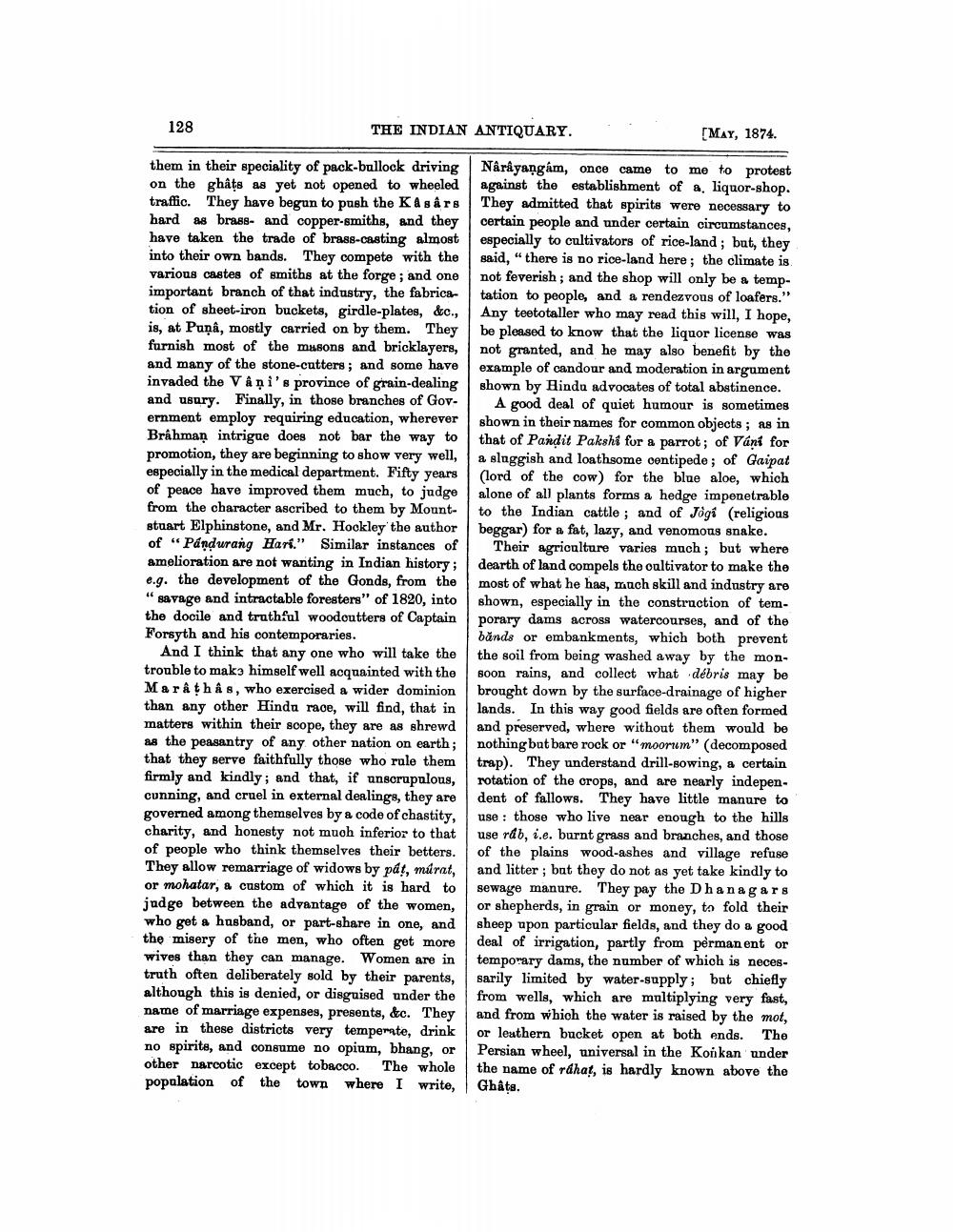________________
128
THE INDIAN ANTIQUARY.
[MAY, 1874.
them in their speciality of pack-bullock driving on the ghâţs as yet not opened to wheeled traffic. They have begun to push the K A sárs hard as brass- and copper-smiths, and they have taken the trade of brass-casting almost into their own bands. They compete with the various castes of smiths at the forge ; and one important branch of that industry, the fabrica tion of sheet-iron buckets, girdle-plates, &c., is, at Punâ, mostly carried on by them. They furnish most of the musons and bricklayers, and many of the stone-cutters, and some have invaded the Vani's province of grain-dealing and usury. Finally, in those branches of Gov. ernment employ requiring education, wherever Brahman intrigue does not bar the way to promotion, they are beginning to show very well, especially in the medical department. Fifty years of peace have improved them much, to judge from the character ascribed to them by Mountstuart Elphinstone, and Mr. Hookley the author of "Pandurang Hari." Similar instances of amelioration are not wanting in Indian history; e.g. the development of the Gonds, from the "savage and intractable foresters" of 1820, into the docile and truthful woodoutters of Captain Forsyth and his contemporaries.
And I think that any one who will take the trouble to make himself well acquainted with the Marathês, who exercised a wider dominion than any other Hinda race, will find, that in matters within their scope, they are as shrewd as the peasantry of any other nation on earth; that they serve faithfully those who rule them firmly and kindly; and that, if unscrupulous, cunning, and cruel in external dealings, they are governed among themselves by a code of chastity, charity, and honesty not muoh inferior to that of people who think themselves their betters.
They allow remarriage of widows by pát, mirat, or mohatar, a custom of which it is hard to judge between the advantage of the women, who get a husband, or part-share in one, and the misery of the men, who often get more wives than they can manage. Women are in truth often deliberately sold by their parents, although this is denied, or disguised under the name of marriage expenses, presents, &c. They are in these districts very temperate, drink no spirite, and consume no opium, bhang, or other narcotic except tobacco. The whole population of the town where I write,
Nâråyangám, once came to me to protest against the establishment of a liquor-shop. They admitted that spirits were necessary to certain people and under certain circumstances, especially to cultivators of rice-land; but, they said, "there is no rice-land here; the climate is not feverish; and the shop will only be a temptation to people, and a rendezvous of loafers." Any teetotaller who may read this will, I hope, be pleased to know that the liquor license was not granted, and he may also benefit by the example of candour and moderation in argument shown by Rindu advocates of total abstinence.
A good deal of quiet humour is sometimes shown in their names for common objects; as in that of Pandit Pakshi for a parrot; of Váni for a sluggish and loathsome centipede; of Gaipat
lord of the cow) for the blue aloe, which alone of all plants forms a hedge impenetrable to the Indian cattle ; and of Jogi (religious beggar) for a fat, lazy, and venomous snake.
Their agriculture varies much; but where dearth of land compels the cultivator to make the most of what he has, much skill and industry are shown, especially in the construction of temporary dams across watercourses, and of the bånds or embankments, which both prevent the soil from being washed away by the monsoon rains, and collect what débris may be brought down by the surface-drainage of higher lands. In this way good fields are often formed and preserved, where without them would be nothing but bare rock or "moorum" (decomposed trap). They understand drill-gowing, a certain rotation of the crops, and are nearly independent of fallows. They have little manure to use : those who live near enough to the hills use rdb, i.e. burnt grass and branches, and those of the plains wood-ashes and village refuse and litter; but they do not as yet take kindly to sewage manure. They pay the Dhanagars or shepherds, in grain or money, to fold their sheep upon particular fields, and they do a good deal of irrigation, partly from permanent or temporary dams, the number of which is necessarily limited by water-supply; but chiefly from wells, which are multiplying very fast, and from which the water is raised by the mot, or leathern bucket open at both ends. The Persian wheel, universal in the Konkan under the name of ráhat, is hardly known above the Ghâta.




